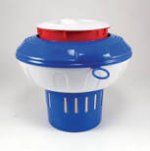Hello! I have an inline chloronator for 3" pucks that I use from time to time to supplement my daily liquid chlorine upkeep when I want to add stabilizer. I use the pucks because I have a lot of them available for free. I run my pump on a low speed and low GPM almost exclusively. My question: Is there a minimum amount of water that needs to flow through the system in order to dissolve the pucks efficiently? I know they will dissolve eventually because they eventually dissolve. It just seems like it takes quite a while compared to other systems I've seen with just pucks. And, the design of the chloronator seems like it needs more gpm flow (head pressure) to operate efficiently. FWIW, the dial is at the top of the tube and it is never full of water when i open it.
Thanks!
michaelmew
Thanks!
michaelmew


